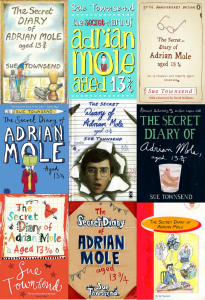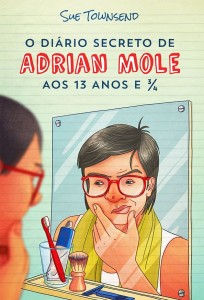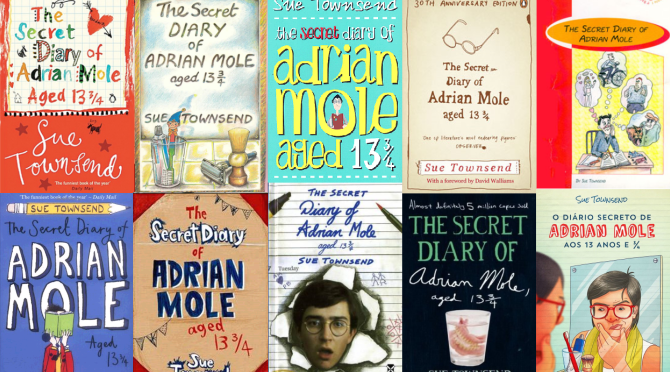
Sue Townsend (1946-2014), creator of Adrian Mole, aged 13¾, has died of a stroke, aged 68. Despite failing her 11-plus exam, leaving school at 15, and being a three-child single mother by 23, she went on to write 17 books, 11 plays and receive half-a-dozen awards including two honorary doctorates. She shared the Freedom of Leicester, where she was born and based the Adrian Mole books, with Leicester-raised singer Engelbert Humperdinck. Her humble writing roots were not dissimilar to JK Rowling’s and she wrote for 20 years before being published. The first volume of Adrian Mole’s Diary was written was working 3 jobs and living on Leicester’s Saffron Lane estate.
Stephen Mangan, who played the television role of Adrian Mole in 2001, said on hearing of her passing, “Greatly upset to hear that Sue Townsend has died. One of the warmest, funniest and wisest people I ever met.”

The Adrian Mole books described the growing pains and internal worries of a teenage boy, his loves and woes, such as glue sniffing and ending up with model aeroplane stuck to his nose! Her first book, The Secret Diary of Adrian Mole, Aged 13¾ became one of the bestselling books of the 1980s in which it was also set.
Within a decade the first book had sold in excess of 2 million copies. To date some 20 million+ copies of the books have sold, as it has spawned numerous sequels and translations, making both Sue Townsend and Adrian Mole famous.
“Perhaps when I am famous and my diary is discovered people will understand the torment of being a 13 3/4 year old undiscovered intellectual.”
Indeed, that is how Adrian saw himself, an aspiring yet unrecognised intellectual with the following catch or caveat:
“I have a problem. I am an intellectual, but at the same time I am not very clever.”
This was evidenced by his confusing “Pride and Prejudice” with “Prejudice or Pride” and not getting the association of Pandora and Box – a tenth unpublished Adrian Mole novel was to have been titled “Pandora’s Box”. Similarly he confused the genders of Evelyn Waugh and George Eliot. His mother found his poetry funny rather than deep, because “she was not an intellectual”.
“Now I know I am an intellectual. I saw Malcolm Muggeridge on the television last night, and I understood nearly every word. It all adds up. A bad home, poor diet, not liking punk. I think I will join the library and see what happens.”
Books offer both the ticket and journey out of dead-end life circumstances. Townsend saw a life littered with literature and books as an opportunity for economic, mental, and social escape.
“To unlock the heavy outer door and to walk into the hushed interior, with the morning light spilling from the high windows on to the waiting books, gave her such pleasure that she would have worked for nothing.” – Sue Townsend, The Woman Who Went to Bed for a Year

In “Rebuilding Coventry“, a 1988 Townsend novel about Coventry Dakin, a woman on the run in London after killing her neighbour with an action man – he was in turn killing his wife at the time, she again writes of her novels characters’ love of books:
“I’ve always loved books. I’m passionate about them. I think books are sexy. They are smooth and solid and contain delightful surprises. They smell good. They fit into a handbag and can be carried around and opened at will. They don’t change. They are what they are and nothing else. One day I want to own a lot of books and have them near to me in my house, so that I can stroll to my bookshelves and choose what I fancy. I want a harem. I shall keep my favourites by my bed.” – Sue Townsend, Rebuilding Coventry
One obituary, in the Telegraph, describes her self-taught literary Damascene journey: “the internal, secret world of books increasingly played a central part in her existence. Having started on Richmal Crompton’s Just William, she quickly graduated to Jane Eyre, and from there to Dostoevsky. ‘Jane Eyre was the first book I read right through, non-stop,’ she said. ‘It was winter, freezing cold, and I remember seeing this thin light outside and realising it was dawn. I got dressed reading, walked to school reading and finished it in the cloakroom at lunchtime. It was riveting.’ She devoured ‘all the Russians, then the French, then the Americans. I remember getting in trouble for reading The Grapes of Wrath under my desk in a boring lesson.'”
Whilst Adrian Mole’s father read Playboy he read Charles Dickens by torchlight and wanted to escape his housing estate existence and find true love with Pandora. His were the trials of a teenage boy, intellectually and sexually thwarted, at one and same time. “Somehow,” writes David Walliams, “Townsend understood what is was to be an adolescent boy better than any adolescent boy.”
“I have realised I have never seen a dead body or a real female nipple. This is what comes of living in a cul-de-sac.”
Her novels featured wry humour, social commentary on class and economic inequalities, and an independent feminism and socialism. The working classes were seen as separate to the pro-Royal “Marks and Spencer set”.
“Well, there are people and people, aren’t there? It was hardly the Marks and Spencer set, was it? Tattooed grandfathers, single parents, Alsatians, delinquents and maladjusted children. Hardly a discriminating public was it?” – Sue Townsend, Bazaar and Rummage [Gwenda speaking] (see more on this)

Although she is most famous for creating a teenage boy and all his adolescent angst, it was her female characters that most reflected her own ideals. For instance, Pauline Mole, Adrian’s mother reads Germaine Greer’s “The Female Eunuch“, cuts her hair short, goes on an assertiveness course, camps out at Greenham Common and seeks to become an independent woman. Similarly, love of Adrian’s life, Pandora, wants to be a free woman yet also a feminist mum, saying:
“I should like to have one child when I am forty-six years of age. The child will be a girl. She will be beautiful and immensely gifted. Her name will be Liberty.” – Sue Townsend, True Confessions of Adrian Albert Mole

In 1987’s “Ghost Children” Townsend explored heavier themes of abortion, body-image, abuse, bereavement, reconciliation and redemption – quite a departure from her usual fare but no less observationally sharp.
Her books appealed to boys and girls, and adults, alike and captured a snapshot of over three decades of British social and political life from Thatcher to Blair (see the satirical “Number Ten“). The Falklands, Old and New Labour, Tony Benn, old-school Communist OAP Bert, even the break up of the SDP all featured. Adrian espoused mixed political beliefs between his desire to get a paper round so that he could afford to go private to sort out his acne and his confusion over the cult and personality of Mrs Thatcher:
“I’m not sure how I will vote. Sometimes I think Mrs Thatcher is a nice kind sort of woman. Then the next day I see her on television and she frightens me rigid. She has got eyes like a psychotic killer, but a voice like a gentle person. It is a bit confusing.”
Tony Blair did not get off lightly in the books either:
“Glenn has been excluded from school, for calling Tony Blair a twat.”
Adrian’s obsession with Tony Blair is described in excerpts from Adrian’s middle-aged diary and his description of Blair surrounding himself, not with “Blair’s Babes” but rather, “Alpha Males” such as Margaret Beckett!
“I am not a trained psychologist but I am wise beyond my 40 years and think that I have discovered why Mr Blair was so keen to become a war leader and to swagger alongside George Bush. He thought it would give him another pair of testicles and would promote him to Alpha Maleness.”
She had planned to write one or two more Adrian Mole novels, the 10th and 11th, to cover the Coalition years of the current Government.
Read more reader suggested memorable quotes from Adrian Mole in the comments section of this Guardian piece.

Her last published novel in 2012, “The Woman Who Went to Bed for a Year“, described as “a funny and touching novel about what happens when someone stops being the person everyone wants them to be.” Reviews said it was “deeper and darker than comedy” (Sunday Times) and “Bursting with witty social commentary as well as humour” (Women’s Weekly). It is a witty and wry observation on life that will be missed.
Sue Townsend, will undoubtedly be missed, despite her few critics and doubters – as evidenced in some comment threads, but most especially for her warmth, generosity and a style of satire, so eminently British, that is paradoxically both sharp and soft on its targets. She was never vicious and left enough humanity in each character she penned or real people she had her creations criticise for each reader to be left to make up their own minds. Take just a sampling of some of the endearing praise on this theme that the media has printed over the last few days:
“…a political fantasy where the Queen is invited to move to a council estate after the creation of the British republic. It’s a gentle approach, but no less powerful for that. Her humour allows you to rise above the politicians and the divisiveness. No one ever got hurt or beaten up because of a Sue Townsend novel, but their conscience was raised nonetheless.” – Bob and Roberta Smith
“A lot of modern comedy is based on cruelty and snobbery, but she found decency and even heroism in Adrian’s delusions of genius, his pointless adoration of Pandora, and his loyalty to Bert Baxter.” – Frank Cottrell Boyce
“While her satire was sharp and scabrous, she treated her characters with a warmth that made them stay with us over the years…warm, satirical style” – Luke Wright
“So funny, without ever being cruel or mocking.” – Isy Suttie
“There was also a kindness in her writing. She treated her characters – and her readers – with such humanity. Always funny, always inclusive, and never cruel.” – Leviathan212
“She was loved by generations of readers, not only because she made them laugh out loud, but because her view of the world, its inhabitants and their frailties was so generous, life-affirming and unique.” – Tom Weldon, chief executive of her publisher Penguin Random House UK
“However, what I love most about this book is that unlike a lot of modern comedy (and yes, I am partly to blame), Townsend’s writing is full of warmth.” – David Walliams (who wrote the foreword to the 30th Anniversary edition of the Secret Diary)
“Sue Townsend did social satire without contempt and cruelty.” – Linda Grant
Remembered, but never to be forgotten. Sue Townsend – through Adrian Mole, will keep a place of affection in readers’ hearts as strong as JK Rowling and Harry Potter.
The Adrian Mole series
- The Secret Diary of Adrian Mole, Aged 13¾ (1982)
- The Growing Pains of Adrian Mole (1984)
- The True Confessions of Adrian Albert Mole (1989)
- Adrian Mole From Minor to Major (1991) including Adrian Mole and the Small Amphibians
- Adrian Mole: The Wilderness Years (1993)
- Adrian Mole: The Cappuccino Years (1999)
- Adrian Mole and the Weapons of Mass Destruction (2004)
- The Lost Diaries of Adrian Mole, 1999–2001 (2008)
- Adrian Mole: The Prostrate Years (2009)
Other books
- Rebuilding Coventry (1988)
- Mr Bevan’s Dream: Why Britain Needs Its Welfare State (1989) [non-fiction]
- The Queen and I (1992)
- Ghost Children (1997)
- The Public Confessions of a Middle-Aged Woman (2001) [non-fiction]
- Number Ten (2002)
- Queen Camilla (2006)
- The Woman Who Went to Bed for a Year (2012)
This article first appeared here.
